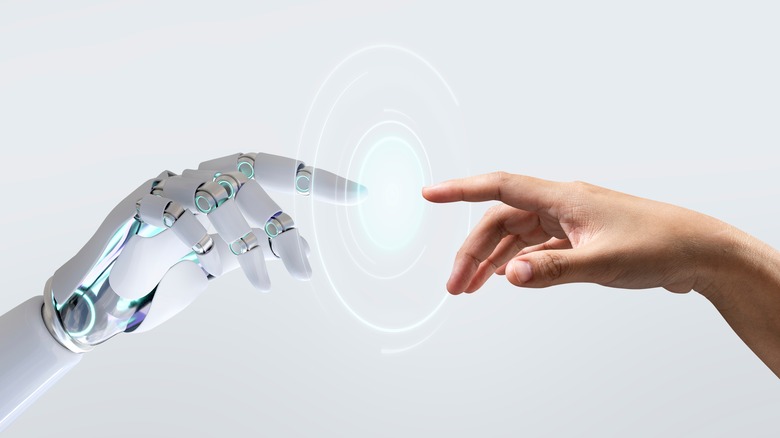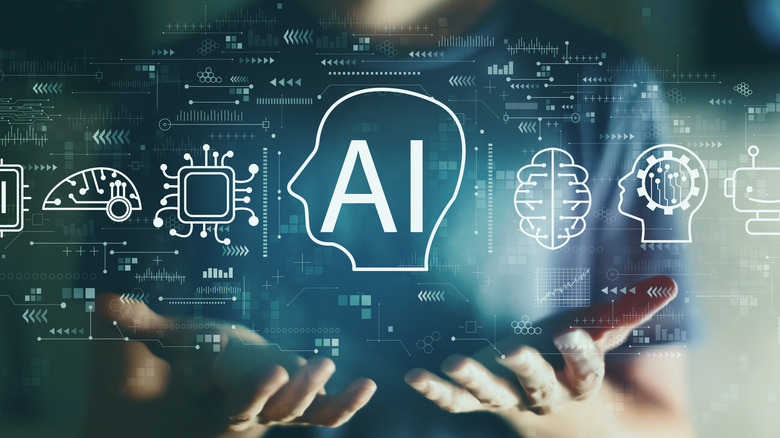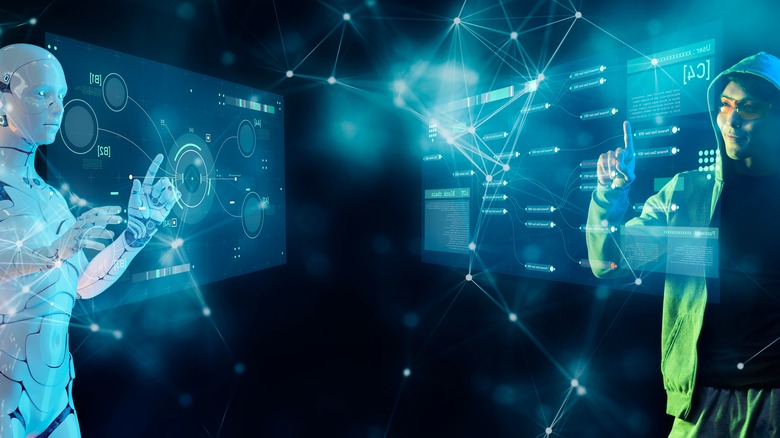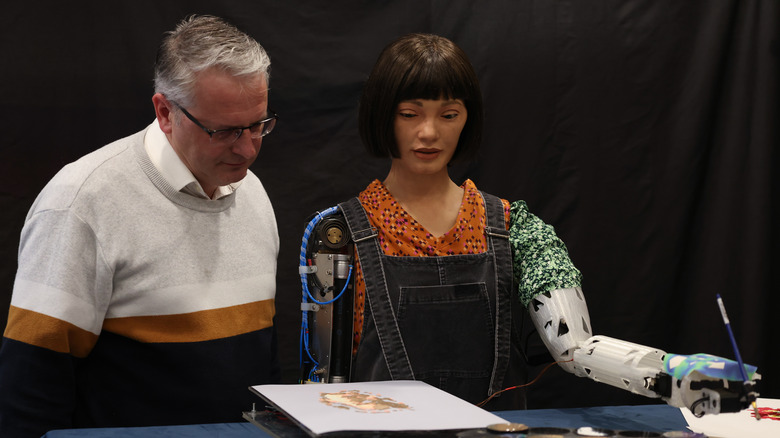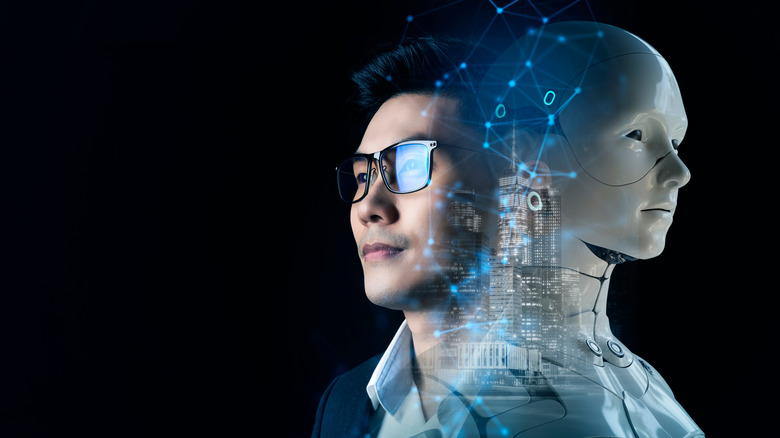The Debate About AI Just Got A Lot More Complicated
In June 2022, Stanford's Digital Economy Lab director Erik Brynjolfsson said in a statement to CNBC that a genuinely sentient artificial intelligence (AI) could be 50 years away. The discussion was prompted by a Google engineer who claimed the AI chatbot LaMDA had achieved sentience, a possibility that Brynjolfsson was quick to shut down. "Sometime in the next 50 years [is more likely] ... Having an AI pretend to be sentient is going to happen way before an AI is actually sentient," said Brynjolfsson.
According to the senior fellow under the Stanford Institute for Human-Centered AI, there are a lot of things that need to happen for artificial intelligence to become sentient. However, it's unsurprising that many people could be tricked into believing that machines have reached this stage prematurely. "Humans are very susceptible to anthropomorphizing things," Brynjolfsson explained. "If you paint a smiley face on a rock, a lot of people will have this feeling in their heart that [that] rock is kind of happy."
Despite this, the debate about the future of AI is more complicated than ever, with many of the world's leaders on opposite sides of the fence. But, before we can judge where we stand on the possibility of sentient AI, it's essential to know what artificial intelligence is and explore what it means to be sentient.
What is artificial intelligence (AI)?
Considered a branch of computer science, artificial intelligence is a type of technology that paves the way for intelligent machines that can mimic human decision-making and actions. According to the University of Washington, John McCarthy coined the term artificial intelligence at a Dartmouth College conference in 1956, however, the ideas behind it have existed for a very long time. In its earliest forms, the idea of giving life to inanimate objects had been the subject of myths and innovations from many of the world's significant early civilizations.
In recent times, artificial intelligence and its uses have evolved exponentially. As technology becomes more powerful each year, so will knowledge management, processing times, and chip sizes. For this reason, the applications of AI have gone from the confines of our screens to things like our cars, smart home devices, and so on. These days, a lot of what makes the debate about the future of AI compelling is its focus on what it means for the tech to gain an awareness and opinion of the world beyond what it was programmed for. In fact, most of the hopes and fears surrounding AI rely on a central question: what happens when AI becomes sentient?
Can AI develop sentience?
Before we can get into the possibility of AI developing sentience, it's important to understand how sentience is defined. Sentience is the ability to feel, which requires a combination of awareness and cognition (via Science Direct). Often, sentience has been related to how other non-human living beings like animals experience their rich inner lives, including complicated emotions like pain, pleasure, and reason.
Google engineer Blake Lemoine renewed debates about this topic when he sounded the alarm on AI that he believed was beginning to develop sentience. Created through Google's Language Model for Dialogue Applications (LaMDA) project, LaMDA is a chatbot AI trained on trillions of words and designed to recreate patterns in human language. In a Washington Post profile with Lemoine, the transcript of the interviewer's discussion with LaMDA revealed the language model's fear of being turned off, how it perceives emotion, and its experience of time, sparking new conversations about whether it is possible for machines to become truly sentient.
However, as Brynjolfsson mentioned, it's more likely that the current versions of AI are simply mimicking sentience, not necessarily experiencing it for themselves. If it really would take another half a century for AI to start feeling the way people do, it's definitely a good time to ask, "What does it mean to be human?"
AI may help shape what it means to be human
According to AI Multiple, most experts agree that singularity or a form of artificial intelligence that reaches human-level consciousness in a machine will eventually arrive at some point in the future — although experts agree that it will likely not happen anytime soon. However, these days, the greatest minds of humanity are on the opposite sides of the fence when it comes to the impact that will have on humanity and our world, and for good reason.
In 2018, the New York Times reported the conflicting views of tech billionaires Elon Musk and Mark Zuckerberg. According to Musk, it is dangerous to create machines smarter than humans, as they could potentially turn on us. In fact, the Tesla and SpaceX founder cautioned his peers against creating technology they could not control. On the other hand, Meta's founder Zuckerberg believes that the reality of the matter is likely not so alarming.
While there is no real way to determine what the effect of sentient AI would be on humans, it's not impossible that it could push forward the next stage of human evolution. In a Discover article, evolutionary biologist Scott Solomon claims that natural selection isn't always about survival and could be reflected in reproduction. Through a combination of improved technology and changes in culture, the introduction of sentient AI could even change how humans view attractive partners and when we bear children.
AI can learn to be like us - for better or worse
At the heart of it, the idea of sentience in machines opens up a discussion on how one defines humanity and what that means for an AI's potential autonomy. Unfortunately, this isn't something that has a straightforward answer for everyone, especially in the kind of divisive world that we live in today. Despite sharing many similarities, humanity is already divided on things like gender, skin color, and race, and there's no reason to assume we'd be any more united in how to deal with intelligent machines.
Beyond that, a 2022 study revealed how robots that used internet-based AI were already known to exhibit racist and sexist tendencies. Knowing this, if AI were to learn from humans at an unprecedented rate, it could also learn all the darker parts of humanity and decide that it could treat us the way we treat each other. In light of that, it's unsurprising that the debate about AI, its future, and what the technology means for humans has become even more complicated. After all, humanity hasn't agreed yet on what it actually means to be human and how to treat each other.
